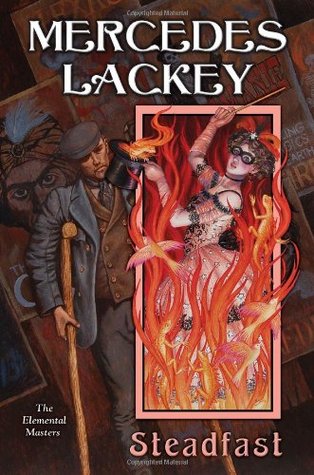I received this book for free from the library in exchange for an honest review. This does not affect my opinion of the book or the content of my review.
Source: the library
Burdens of the Dead
by
Dave Freer, Eric Flint, Mercedes Lackey
alternative history, fantasy, science fiction in Hardcover edition that was published by Baen Books on June 4, 2013 and has 438 pages.
Explore it on Goodreads or Amazon
Other books by this author which I have reviewed include Changer of Worlds, Belisarius I: Thunder at Dawn, Torch of Freedom, Destiny's Shield, Fortune's Stroke, The Tide of Victory, The Dance of Time, Cauldron of Ghosts, Unnatural Issue, "The River's Gift", Finding the Way and Other Tales of Valdemar, Foundation, Intrigues, Gwenhwyfar: The White Spirit, Owlknight, Charmed Destinies, Changes, Beauty and the Werewolf, Invasion, Home From the Sea, Dead Reckoning, Conspiracies, Bedlam's Edge, Crown of Vengeance, Redoubt, Harvest Moon, World Divided, Elemental Magic: All New Tales of the Elemental Masters, Sacrifices, Steadfast, Bastion, Victories, Blood Red, The House of the Four Winds, Games Creatures Play, Closer to Home, Born to Run, Wheels of Fire, When the Bough Breaks, Chrome Circle, Changing the World: All-New Tales of Valdemar, Under the Vale and Other Tales of Valdemar, Arcanum 101, A Tangled Web, Winter Moon, Moving Targets and Other Tales of Valdemar, Elementary: All-New Tales of the Elemental Masters, No True Way: All-New Tales of Valdemar, From a High Tower, Hunter, Closer to the Heart, Silence, A Study in Sable, Elite, Closer to the Chest, Tempest: All-New Tales of Valdemar, A Scandal in Battersea, The Hills Have Spies, The Bartered Brides, Dragon's Teeth, Eye Spy, Breaking Silence, Pathways, Passages, Magic's Pawn, The Black Gryphon, Magic's Promise, The Serpent's Shadow, The Oathbound, The White Gryphon, The Silver Gryphon, Beyond, Spy, Spy Again, Oathbreakers, The Lark and the Wren, The Gates of Sleep, Phoenix and Ashes, The Wizard of London, The Robin and the Kestrel, Oathblood, Take a Thief, Exile's Honor, The Silver Bullets of Annie Oakley, Owlflight, Brightly Burning, Exile’s Valor, Sword of Ice and Other Tales of Valdemar, Crossroads and Other Tales of Valdemar, Crucible, Choices, Into the West, Into the West, Sun in Glory and Other Tales of Valdemar, The Fire Rose, The Case of the Spellbound Child
Fourth in the Heirs of Alexandria historical fantasy series revolving around two young men…wow, young men. When I started this series, Marco and Benito were just kids, scrabbling for a living, and now it’s 1540 Venice.
NOTE: This is not historically accurate as Constantinople fell to the Ottomans in 1453 while Lackey, Flint, and Freer (LFF) have written this story as though the Palaeologus family still ruled.
My Take
Well, the prequel was vague and introduces an unexpected element, but it’s only one page and does provide a hint of what is to come.
I do love this series with the strategy and maneuvering, the tactics, the battles, and that inside look at Italian politics and magic. It’s a fascinating combination of the history of Venice, its relations with its competitors within and without Italy, including Constantinople, and the gods and goddesses of the area.
Burdens of the Dead is a complex story with so much happening in it, yet LFF keep it coherent and easy to follow. I enjoyed the interaction between Antimo and Hekate. Too much time has passed since people worshipped Hekate and people have forgotten what she still expects, which makes for some interesting thought processes by both parties. I’d be curious to know how much LFF were inventing and how much is “common knowledge”.
Our heroes — Benito and Marco — are atypical for the time as they want to save life, and they’re not interested in power. They’re good people with a lot of allies.
Oh, crack me up! I love the Venetians’ reaction to Dr. Turner! If ever there was a comparison between medieval medicine and what we know today. Makes me wonder how today’s medical wonders and our expectations will be viewed 500 years in the future.
“In the minds of the ordinary folk, books were a powerful testimony to intellect. Using them was not.”
I did enjoy Lemnossa’s battle. Useful tactics, and well enough written that I could visualize how he placed and used his ships. Too bad he couldn’t be in charge of the fleet heading back to Constantinople. Of course, he might not have been devious enough to get around that idiot Borana. However do men like him get put in charge? And it’s not limited to this time period. Idiots always seem to rise to a position of command. Look at the Allied command in World War I…
It’s foiling plots, wreaking havoc, planning tactics and battles, and getting reacquainted with the gods and goddesses of old.
I ain’t buying it that Hekate is that gullible when Chernobog lies to her. And I’d say about half of the section on Hekate becoming aware of the world again feels right but the other half was clumsily done and too “cute”.
The Story
It’s Mario Calchetti, one of two surviving seamen from a small convoy that was attacked, who bears witness and warns the Venetian podesta in Trebizond who, in turn, manages to send the Eastern Fleet, led by Admiral Lemnossa, out ahead of time with its cargo of women and children to Constantinople. A city besieging its own allies within its walls.
Meanwhile, in Venice, Benito and Duke Enrico will be leading a Venetian fleet against Constantinople. It’s the wrong time of the year for ships to sail the Mediterranean, but the Venetians will follow Benito anywhere. And Benito hedges his bets with help from the tritons.
It’s lucky for the Valdosta boys that Maria does have that bargain to live with the Lord of the Dead as he cares enough to allow her a window into her human world. One that will prove useful in days to come.
Hekate has spent the centuries mourning the loss of her children, until Antimo changes her perspective, and she becomes aware again of the world. A change that becomes stronger after she helps with the birth of Spiro and Eleni’s child.
The big question is, can they slash through all the webs Chernobog is weaving throughout their world?
The Characters
Benito Valdosta and Maria Verrier, the earthmother, have a daughter, Alessia. Benito has learned he is the son of Carlo Sforza, the grandson of the duke of Ferrara, and Benito is now acting governor-general of Corfu. He’s come a long way from his canal-brat days. To help save Corfu, Maria made a bargain much as Demeter did and is the wife of the Lord of the Dead for four months every year as well as the high priestess for the Mother Goddess of Corfu.
Marco Valdosta is Benito’s half-brother, and now, the ward of Doge Dorma and grandson of Duke Enrico Dell’este. Married to Katerina, Lodovico Montescue‘s granddaughter, he studies medicine, treats the poor of Venice, and tries hard to avoid politics. He has been carrying the mantle for the Lion of Saint Mark since Shadow of the Lion, 1. The couple lives in Kat’s family home, the Casa Montescue.
Both boys, men I should say, are beloved by the common people of Venice: the Strega.
Doge Petro Dorma and the masked Council of Ten rules in Venice. Admiral Dourso is a friend of Lodovico’s. Marco suspects that Lord Calmi is Venice’s spymaster. The Schiopettieri are the guard of the Ten.
Izaak ben Joseph is a goldsmith and Kabbalistic mage who lives in the Camp Ghetto in Venice. He has an affinity for his raw material and suspicious of some Byzantium gold.
Marissa di Pantara is a bastard daughter of the Casa Brunelli for whom the priest begs Marco to find work for her as she is depressed from the loss of her daughter.
Admiral Lemnossa is brilliant but unappreciated, bringing valuable news to Benito.
The Venetian fleet bound for Constantinople…
Admiral Dourso commands the Venetian fleet. Giuliano Lozza, a swordsman and landowner in Corfu, is married to Thalia. Count Alfons of Valderobes dresses well and hasn’t a clue; he commands the Aragonese fleet. Admiral Borana, the Genovese commander, is unsure whether to be submissive or aggressive, but Benito knows how to work around him.
In Ferrara…
Duke Enrico Dell’este of Ferrara, the Old Fox, finds much to be proud of in his grandsons. His people love him, and he works to keep them and his family safe. Lorendana, his daughter, had been married to Valdosta and became Sforza’s mistress, so her sons Marco is a true Valdosta while Benito is not.
In Milan…
Carlo Sforza, the Wolf of the North, is the most notorious mercenary condottiere (and a real life figure) in all of Italy and currently is employed by the duke of Milan. He fears his son even as he is filled with pride for him. Francisco Turner is Sforza’s personal physician. Sforza’s captains include Melino and Di Galdi.
Duke Filippo Maria of Milan will do anything to hurt Venice, including kidnapping. Augustino, Count di Lamis, is the duke’s second cousin, and bears a resemblance to Sforza, a fact the duke uses.
In Genoa…
Doge Doria must pay attention to which way the political winds blow. Captain Carlos Di Tharra of Sardinia leads the first Genoese fleet and participates with the fleet heading to Constantinople. He wishes to fulfill one of his family’s greatest fantasies — a meeting with Androcles, the triton.
Trebizond…
Michael Magheretti was thrilled, at first, when he was appointed podesta in Trebizond. Lucky for him he doesn’t like coffee. Signor Juliano Gambi is feuding with Signor Nestor Paravatta; both are merchants to whom the Hypatians pass the warning.
Iskander Beg, an Illyrian, is the Lord of the Mountains.
Ilkhan Hotai the Ineffable, a Mongol and Great Khan of the Southern Horde, is based in Baghdad. He’s gotten lazy over the years, but his wits have never dimmed. He comes to have doubts about Grand Vizier Orason. General Quasji commands in the northern march; General Harob campaigns in Cicilia and is a devout Nestorian; and, General Malkis is retired but has great influence. Borshar was sent as a tarkhan, an emissary, to the Golden Horde. Tarkhan Qishkai is sent by Ilkhan to take down Borshar.
In Constantinople…
Antimo Bartelozzi is a spy for the duke of Ferrara and has a love for dogs. Signor Porchelli is the Venetian ambassador. Vestarch Kasares, one of the eunuch administrators in Byzantium, is bewitched. Primikerios Melekaniodes is the eunuch in charge of allocations who tried to please too many sides.
Emperor Alexius rules, sort of. He’s too weak and ineffectual to be of much use. Terrified of being overthrown and too cheap to spend the money, Constantinople has no real army nor any good commanders for what there is.
Hekate is the goddess of childbirth, witchcraft, the cares and concerns of the common people, the hunt, the Crossroads and Gateways; and she roams the roads, mourning the loss of her children, carrying her bone harpoon, and accompanied by her red-eared dogs, Ravener and Ripper. The Hypatian Siblings are a religious order in Constantinople with healing skills. It appears that they are very well prepared for all sorts of contingencies! Brother Ambrose is saved from assassination and proves a point.
The Black Brain, Chernobog, the monster of Vilna, is a demon prince who has taken over the body of the black-magic-using Prince and Grand Duke Jagiellon of the Grand Duchy of Lithuania. It’s actually an improvement. Count Mindaug once belonged to Jagiellon before he fled to Elizabeth Bartholdy, Jagiellon’s contemporary and rival. Count Tcherkas has taken his place. Poulo Bourgo is a Milanese thief, mercenary, bodyguard, who can’t go back to Venice, a concern that Chernobog renders immaterial even as he makes Bourgo invincible. The change makes it simple for Bourgo to enter Venice and reconnect with those from his slaving and drugrunning days. Lord Paletto of Venice had partnered with Poulo to satisfy his own sexual appetites and the Di Farvelli clan in business. Malaki Molados is a pimp, used furniture dealer, and drug dealer.
The Baitini are assassins who look to one man, supposedly: the Old Man of the Mountain in Alamut, their official leader, but in truth the Supreme Master of the Hidden Hand is one of those who gives them orders. A series of decisions from the Master of the Blade, the Master of Poisons, the Master of the Garotte, and the Master of the Hidden Hand are made from a belief in their own invincibility. Abdullah and Malkis are trapped in the cloister.
Prince Manfred of Brittany, the nephew to the Holy Roman Emperor, Charles Fredrik, and second in line to the throne, and his mentor-bodyguard Erik Hakkonsen have left to visit the Mongol Horde (Much Fall of Blood, 3). Erik is married to Princess Bortai of the Hawk clan of the Mongol White Horde within the Golden Horde. Since he killed Borshar, he’ll get the 100,000 whatever reward.
The great winged Lion of Saint Mark is a powerful magical creature who protects Venice; his mantle can only be taken up by one of the first four families of Venice: the Montescue (only Lodovico and Katerina are left), Lacosto (all gone), Terrio (gone), and the Valdosta (only Marco is left). The tritons, merfolk, include the undine Juliette, Umberto’s sister as well as Alessia’s godmother, and the triton Androcles are usually contacted at St. Raphaella, the water-chapel. Mages who gather to help include Bella Santini, a midwife; Sister Serenity, a Hypatian sibling; a nameless old man; and, Trillium, a fey child-woman from the marsh.
Aidoneous is the Lord of the Dead. In Much Fall of Blood he made a bargain with Maria: four months with him in his lands and the other eight with Benito. Poseidon is the god of the sea, a.k.a., Earth-Shaker. Amphitre was his wife until he betrayed her one too many times. Pegasus is the son of Hekate and Poseidon, imprisoned by his father in a long ago time.
The Cover and Title
The cover of the book I read is definitely a Baen with a colorful collage of deep oranges and blues with the black winged Lion of Saint Mark flaring and snarling atop the ruins. The cover pictured places Pegasus atop the ruins instead.
The title seems to be more of a reference to the end of this story with the new bargain Maria makes with the Lord of the Dead, to carry the Burdens of the Dead.














